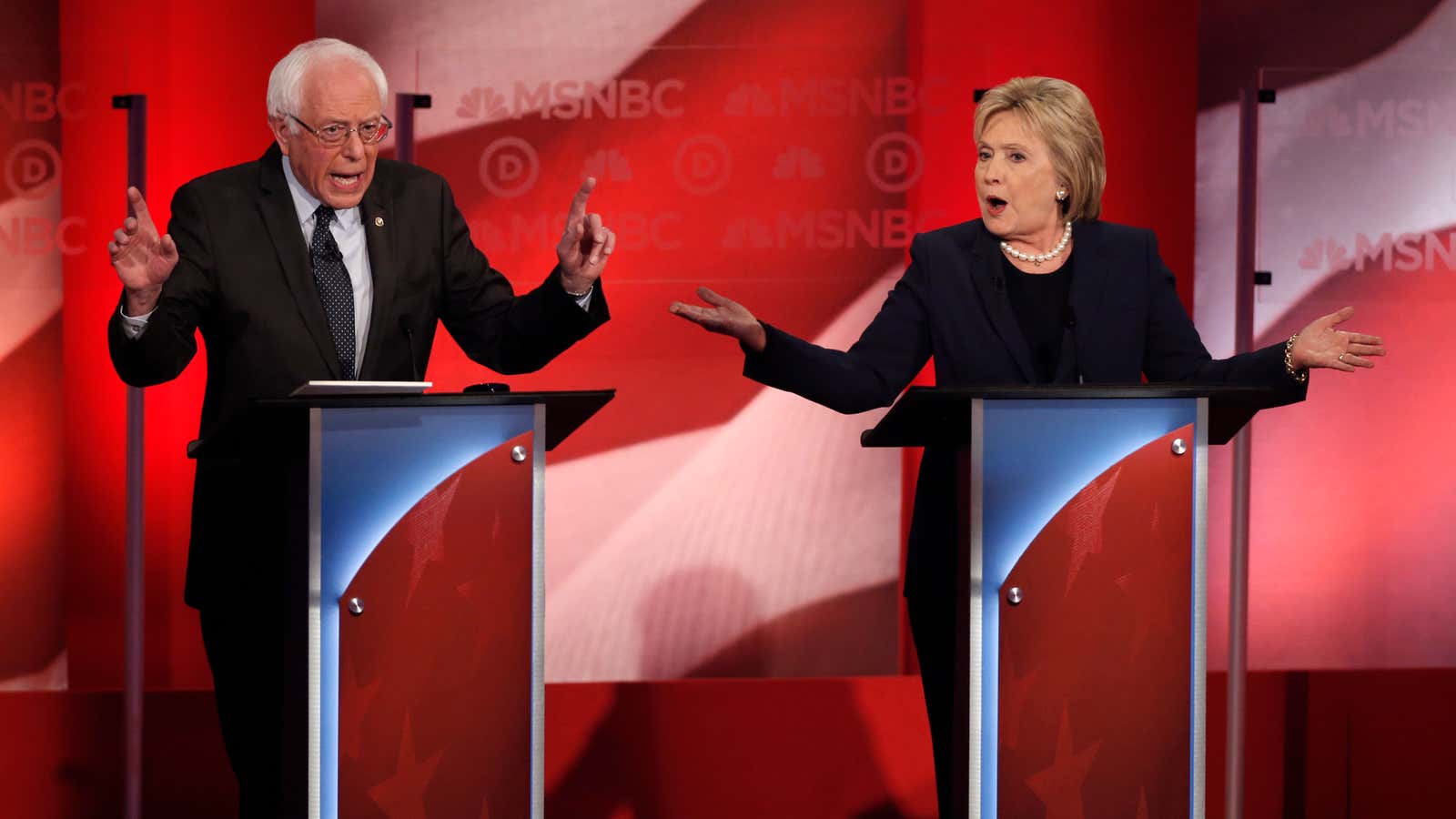Until fairly recently, Hillary Clinton and Bernie Sanders have taken great pains to be congenial. In their initial appearances during election season, they seemed to be trying to outdo one another in expressions of “deep respect.” But coming out of a near-tie in the Iowa caucuses and an anticipated win for Sanders in New Hampshire tonight, the Democratic candidates’ rivalry has sharpened.
A passive-aggressive Twitter argument between the candidates, and an ongoing shouting match over who is a true progressive, crescendoed during the Democratic debate on Feb. 4. Clinton charged Sanders with running a negative campaign, contrary to his own promises, and called on him to end the “artful smear” that she has been bought by Wall Street. The audience cheered. Sanders scowled and shook his head. It was a gloves-off kind of moment. As Chris Hayes of MSNBC tweeted, “The intensity in the room during that last exchange was unreal.”
The open hostility of that moment was unexpected, especially so early in the debate. But it also felt overdue—not just because the candidates’ criticisms of each other have been building, but because in-fighting is already present among Democratic voters themselves. Sanders supporters have started booing Clinton. Some engage in nasty online attacks and vitriolic trolling of Clinton supporters. Speaking to a New Hampshire audience on Sunday, Bill Clinton noted that the language of these attacks is “literally too profane… not to mention sexist, to repeat.”
In certain Sanders circles, the contempt for Clinton nearly matches that of the Republicans. Some have gone as far to say that they won’t support her if she wins the Democratic nomination. They’ll abstain from the election entirely, or consider the Republican nominee instead. In his Huffington Post article, “Voting only for Bernie Sanders and not Hillary Clinton will teach the DNC a lesson,” H.A. Goodman explains: “I won’t allow anyone to intimidate me into choosing the lesser of two evils.” Meanwhile, some of Clinton’s highest-profile supporters have also gotten in trouble, notably Gloria Steinem. The feminist icon claimed (perhaps a bit flippantly) that young women who supported Sanders were only doing so in order to meet “boys.” (Steinem later apologized.)
The GOP’s identity crisis has become a commonly accepted and oft-analyzed truth of the current political scene. But Sanders’ dark-horse campaign is forcing the Democratic Party to grapple with its identity, too. This is surprising, especially in the final days of a Democratic administration which most party members look back on relatively favorably. Obama may have failed to realize his dream of uniting red and blue America, but he seemed at least to have solidified what it means to be a Democrat in the 21st century. Has the rivalry between Sanders and Clinton created a crisis that wasn’t there before? Or has it merely brought latent divisions to light?
What is perhaps most striking about the current in-fighting among Democrats is how one-sided it is. You don’t hear many Clinton supporters saying they would refuse to vote for Sanders if he is the nominee. In fact, they tend to acknowledge his appeal. But less than half of Democratic primary voters say they would enthusiastically support a Clinton nomination, according to a September CBS/New York Times poll. According to the Times, 27% say they would support her with “some reservations” and 14% say they would not support her at all.
It is reasonable that there should be some intra-party competition during a primary campaign. But it makes little sense that Sanders supporters would refuse to unite behind a Democratic ticket. From a liberal standpoint, this kind of insistence on political purity is dangerous rather than admirable. It risks both putting a Republican in the White House—leading to a potentially catastrophic rolling back of healthcare reform, federal subsidies, LGBT protections, and other achievements of the Obama administration—and encouraging a culture of non-participation. Ironically, political apathy and low voter-turnout are precisely the behaviors that Sanders is trying to change.
Moreover, there are millions of Americans who legitimately cannot afford another Republican in the White House.
Democrats’ staunch loyalty to Sanders is arguably the result of his underdog status. His supporters want to stand with their preferred candidate even if he’s labeled unelectable. This is a revolution, and they don’t want to “compromise.” But as both candidates have repeatedly acknowledged, their platforms look similar in a lot of ways. They certainly resemble each other more than any candidate on the Republican side.
Democrats once complained about going through the motions of an inevitable Clinton “coronation.” The party may end up facing a very different problem: Convincing Sanders’s ardent base to recover from the Bern and mobilize behind Hillary. Democratic voters’ passion in the primary stage is good, but the consequences of a mass voter strike would threaten the core principles that liberals have worked so hard to protect.
